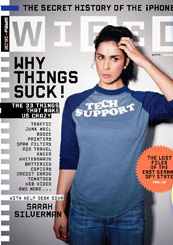
Since I can’t seem to finish the real posts I’ve been working on, here’s a few things I picked up from the latest Wired, posted here so you don’t have to.
Pg. 084: Unmasked By Facebook:
Scott Brown wrote this quick column on the former fragmentation of the self that one once enjoyed by spreading one’s persona across various social networking sites. You can’t do it so much anymore. We’re all linked up and the real you is bound to come through. Google one site, then another. You’re there somewhere, and that you’d better jive with the guy that you’ve been pretending to be at the office, at church, at the little league game. You get the idea.
Why does this interest me?
I recently took a stab at signing up for LinkedIn, the professional person’s preferred place to press the virtual flesh. I didn’t get very far as the concept left me cold. “That’s not me!” I wanted to scream at the screen. “I’m not that guy!” My credentials added up to something less than the sum of their parts, or so I felt. Call it pride, call it vanity, call it some sort of basic insecurity, I simply didn’t want to make a general announcement to all fellow alumni and assorted professional peers that this was me. That this was the new me, the real me, the Be All That You Can Be Me. I looked at it, and realized that my life is fragmented, and some of those cracks are killing me. Like the lemurs of Madagascar after the island cracked off of the African coast, I’d begun to evolve into two separate species, and I just don’t have the strength to keep up two lives. I need it all to be linked in.
Pg. 052: Take the Red Book:
Or, why sci-fi is the last bastion of philosphical writing, by Clive Thompson.
A friend recently described some of my sci-fi novels, beloved of an earlier era, as “Danielle Steele for boys.” That stung a bit, but the point was taken. That friend is a girl. And as this column points out, “many of sci-fi’s most famous authors have positively deranged notions about the inner lives of women.”
The bottom line is that sci-fi can’t seem to do everything right. It doesn’t handle romance (I remember wincing whenever Neil Stephenson would toy with “sexy lady’s dialogue” in the Cryptonomicon) but it does handle ideas really well. It runs an experiment in which you take reality and change a few variables and then run with it. No it’s not reality, but like an image in a mirror, it might reflect back some reality that you’ve been trying to miss.
I’ve been meaning to post a compare/contrast between The Sparrow and A Canticle For Leibowitz which will further explore some of this. Oh, stay tuned!
